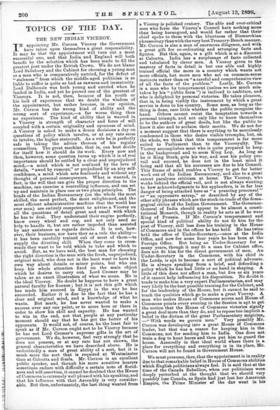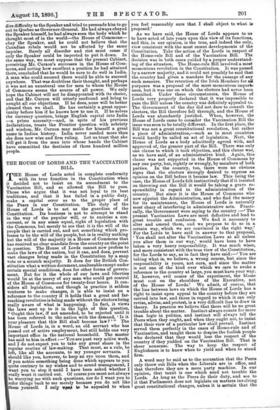TOPICS OF THE DAY.
THE NEW INDIAN VICEROY.
IN appointing Mr. Curzon Viceroy the Government have taken upon themselves a great responsibility. It may be that the appointment will turn out a most successful one, and that India and England will both benefit by the selection which has been made to fill the greatest post under the British Crown. We do not blame Lord Salisbury and the Cabinet for choosing a young man or a man who is comparatively untried, for the defect of " staleness " from which the middle-aged politician is so liable to suffer is quite as bad as rawness and immaturity. Lord Dalhousie was both young and untried when he landed in India, and yet be proved one of the greatest of Viceroys. It is not, then, because of his youth or his lack of experience that we doubt the wisdom of the appointment, but rather because, in our opinion, Mr. Curzon has the wrong kind of ability and the wrong sort of experience,—a far worse thing than no experience. The kind of ability that is wanted in a Viceroy is strength of character and force of will coupled with a certain originality and openness of mind. A Viceroy is asked to make a dozen decisions a day on questions of policy which involve, or at any rate seem to involve, the higher statecraft. As a rule he is perfectly safe in taking the advice thereon of his regular counsellors. The great machine, that is, can best decide for itself how it should do its work. Every now and then, however, some question turns up which it is of real importance should be settled by a clear and unprejudiced mind,—a mind which is not confused by the love of details, "awed by rumour," or prejudiced by an airy self- confidence, a mind which acts fearlessly and without any thought of personal consequences. What is wanted, in fact, is the will that can give the proper direction to the machine, can exercise a controlling influence, and can set up and maintain in place one or two plain principles. The heads of the Indian Bureaucracy (on the whole the most skilled, the most perfect, the most enlightened, and the most efficient administrative machine that the world has ever seen) are entirely competent to advise a Viceroy on all the questions of detail great and small with which he has to deal. They understand their engine perfectly, know every wheel and cog, and not only need no lexlp to handle it, but are rather impeded than assisted by any assistance as regards details. It is not, how- ever, their business, nor have they as a rule the ability— it has been carefully trained out of most of them—to supply the directing skill. When they come to cross- roads they want to be told which to take and which to avoid. But, as we have said, the best man for choosing the right direction is the man with the fresh, unprejudiced, original mind, who does not in the least want to have his own way about details or minor points, but who can keep his whole attention fixed on the main object which he desires to carry out. Lord Cromer may be taken as an exact illustration of what we mean. He is the ideal Viceroy. No doubt he happens to have a great natural faculty for finance ; but it is not this gift which has made him succeed in Egypt in the way he has succeeded. Rather it is due to the fact that-he has a clear and original mind, and a knowledge of what he wants. But mark, he has never wanted to make a success over any one point, or to score here or there in order to show his skill and capacity. He has wanted to win in the end, not that people at any particular moment should say that he has got the better of his opponents. It would not, of course, be the least fair to speak as if Mr. Curzon ought not to be Viceroy because he has not Lord Cromer's supreme gifts in the art of government. We do, however, feel very strongly that he does not possess, or at any rate has not shown, the general characteristics we have described above. He is undoubtedly a man of great ability of a sort, but it is much more the sort that is required at Westminster than at Calcutta and Simla. Mr. Curzon is an excellent public speaker, and though his more sensitive hearers sometimes endure with difficulty a certain note of florid- ness and self-assertion, it cannot be doubted that the House of Commons is extremely well pleased with his speaking, and that his influence with that Assembly is very consider- able. But then, unfortunately, the last thing wanted from a Viceroy is polished oratory. The able and over-criticat men who form the Viceroy's Council hate nothing more than being harangued, and would far rather that their chief spoke to them with the bluntness of Bismarckian phraseology thanwith the very best Treasury-Bench manner.. Mr. Curzon is also a man of enormous diligence, and with• a. great gift for co-ordinating and arranging facts and figures. But this, again, is a gift which is at a discount.
at Calcutta. India has a surplusage of facts collected and tabulated by clever men. A Viceroy given to the mastery of facts in detail is but one able and highly. trained official the more in a country which wants not more officials, but more men who act on common-sense instincts rather than on " a careful and comprehensive view: of all the facts of the problem." Lastly, Mr. Curzon is a man who by temperament (unless we are much mis- taken by his " public form ") is inclined to ambition, and who is delighted by personal victories. He takes pleasure,. that is, in being visibly the instrument by which a great service is done to his country. Some men, as long as the- thing is done, care little whether the public recognise the- hand. Others cannot resist the temptation towards a personal triumph, and not only like to know themselves- to be the authors of great deeds, but like the public to- know it also and to acclaim their merits. We do not for a moment suggest that there is anything to be mercilessly, condemned in those who desire visible triumphs, but, on- the whole, we think that this temperament is far more suited to Parliament than to the Viceroyalty. The Viceroy accomplishes most who is quite prepared to keep, in the background and to seem King Log. As long as he is King Stork, gets his way, and sees his policy pre- vail and succeed, he does not in the least mind it.
being said that all his successes are due to his Council. This frame of mind enables a Viceroy to get far better- work out of the Indian Bureaucracy, and also to a great extent paralyses criticism at home. The Viceroy, wha works behind the official veil, and is not always wanting. to bow acknowledgments to his applauders, is in far less danger of being attacked here as " a prancing proconsul or " an oppressive satrap," or described by any of the other silly phrases which are the stock-in-trade of the dema-. gogical critics of the Indian Government. The Governor- General of India should appear to be almost a consti- tutional Monarch, though in reality he acts as if he were King of Prussia. If Mr. Curzon's temperament and special kind of political ability do not fit him for the of Viceroy, still less does his training in the House- of Commons and in the offices he has held. He has twice- held the office of Under-Secretary,—once at the India Office, and now for some four years he has been at the Foreign Office. But being an Under-Secretary for so many years, though it may fit a man for Cabinet office, does not fit him for the direct government of men. An Under-Secretary in the Commons, with his chief in- the Lords, is apt to become a sort of political advocate.. He is always speaking from a brief, and defending a. policy which he has had little or no hand in shaping. A little of this does not affect a man, but five or six years of it cannot help influencing his disposition. No doubt it. tends to make him a very expert Parliamentarian, and may very likely be the best possible training for the Cabinet, and for the leadership of the House, but it cannot be said te- teach the qualities which go to make a great Viceroy. A. man who makes House of Commons scores and House of. Commons points every evening in the Session is apt to get the notion that the House of Commons victories signify a great deal more than they do, and to repose too implicit a. belief in the dictum of the great Parliamentary magician, —" With words we govern men." Very possibly Mr.. Curzon was developing into a great House of Commons leader, but that was a reason for keeping him in the Commons, not for sending him to India. One does not. train a dog to hunt hares and then put him to guard the- house. Assuredly in that ideal world where there is a. place for everything and everything is in its place, Mr. Curzon will not be found in Government House.
We must presume, then, that the appointment is in reality due to that remarkable belief in House of Commons abilities which English politicians always feel. It is said that at the time of the Canada Rebellion, when our politicians were deeply perturbed at the thought that we should very possibly lose Canada, as Spain had just lost her American. Empire, the Prime Minister of the day went in his dire difficulty to the Speaker and tried to persuade him to go out to Quebec as Governor-General. He had always obeyed the Speaker himself, he had always seen the body which he thought most of in the world—the House of Commons— obey the Speaker, and he could not believe that the Canadian rebels would not be affected by the same impulse. Surely all disorder and riot must cease if only the Speaker could be imported to put it down. In the same way, we must suppose that the present Cabinet, perceiving Mr. Curzon's successes in the House of Com- mons, and noting how excellent a position he had attained there, concluded that he would be sure to do well in India. A man who could succeed there would be able to succeed anywhere. That was doubtless their thought, and perhaps it was not an unnatural one for men to whom the House of Commons seems the source of all power. We only hope the Cabinet will not be disappointed with its choice, and that Mr. Curzon will utterly confound and bring to nought all our objections. If he does, none will be better pleased than we shall. He has certainly a great oppor- tunity before him if he knows how to use it. If he solves the currency question, brings English capital into India —a prime necessity—and, in spite of his previous declarations, treats the Frontier question with sobriety and wisdom, Mr. Curzon may make for himself a great name in Indian history. India never needed more than she does now wise and firm ruling. Let us trust that she will get it from the man into whose hands the Cabinet have committed the destinies of three hundred million people.



































 Previous page
Previous page